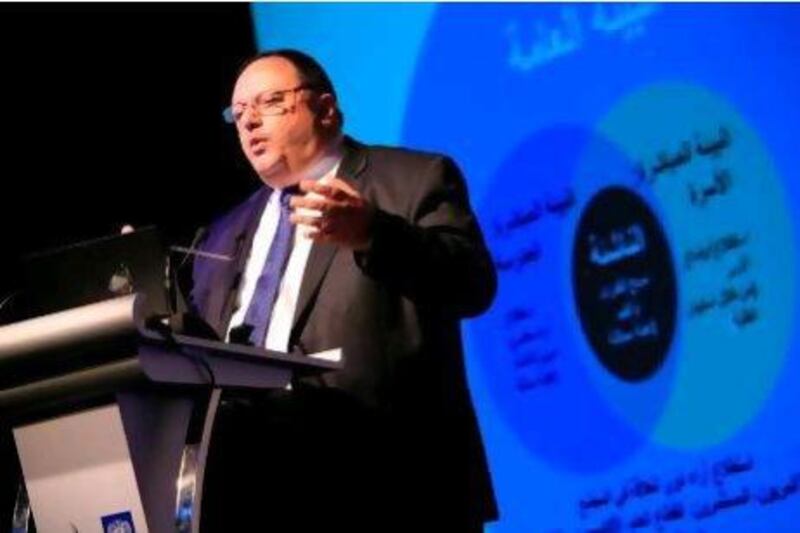DUBAI // A groundbreaking report has presented a sobering challenge for the UAE's education system and places special emphasis on the need for career guidance.
The Arab Knowledge Report 2010/2011, released yesterday by the Mohammed Bin Rashid Al Maktoum Foundation, polled more than 6,000 youth around the Arab world - including 1,375 Emirati pupils - 500 teachers and 200 Arab intellectuals.
Researchers found Emirati pupils' complacency may have tempered their ambitions and hampered their career development.
The study found that due to efforts to secure the future of citizens through laws and development initiatives, many young people had relatively low ambitions.
Almost one quarter of young Emiratis polled were found to have a "zero" score in "future-planning skills".
affecting factors including life ambitions and career drive, the report found.
On average, Emiratis polled were found to have scored 4.72 on the future-planning scale, where the required minimum was 12.5.
About 52.6 per cent of teachers polled said most pupils were more interested in the acquisition of material things than in cognitive skills.
"It seems students' assurance of their future has positively influenced the skill of self-esteem and negatively influenced the skill of future planning," the report read.
A culture of consumption, luxury and dependence on others and foreigners hampered their drive and ambitions.
The low level of cognition skills among pupils was found across surveyed Arab countries. Pupils received an average of 32.67 - under the required level by 17 degrees.
Their average in self-esteem and self-knowledge were about 20 points across all Arab countries polled, indicating a high degree of self-confidence and a positive perception of self-capacity.
Future-planning skills were also found to be lacking among pupils of other countries.
Some of the reasons for this in others countries included a conflict between desire for independence, and financial dependency on the family and future choices governed by parental pressure.
Amna Khalifa, who conducted field studies for the UAE, said the findings must be used to change the way education is delivered.
"Their poor research and problem-solving skills, and lack of participation in civic society are also major weaknesses," Ms Khalifa said. "The report should be taken as a starting point and emphasis should be placed on both schools and families."
Dr Karima Al Mazroui, the manager of the Arabic curriculum at the Abu Dhabi Education Council (Adec), said pupils' laissez-fare attitude towards their future was a result of a lack of guidance at a crucial age.
"It's not wealth but the lack of career guidance in school," Dr Al Mazroui said. "They are young and need someone to assess their strengths and suggest how to move forward."
She said the large number of compulsory subjects in high school should also be considered a factor.
"Because they do not have an opportunity to identify their interests in school, they remain confused in university as well," Dr Al Mazroui said.
She said Adec's changes to the education system aimed to make pupils more responsible and committed towards their future well-being.
Mariam BuAlShawarib, an Emirati HR manager at a private company, admits she had a hard time choosing her career path after school.
"I changed my major several times before I settled down on what I really wanted to do," Ms BuAlShawarib said. "So yes, career guidance would have helped me."
But she disagreed that Government programmes for Emiratis had deterred them from working hard.
"I have achieved a lot and have worked my way up," Ms BuAlShawarib said. "I worked for a government organisation for a while but then moved because I wanted to challenge myself."
Researchers also found children displayed weakness in their problem solving, written communication and IT skills, not only in the UAE but also in Yemen, Jordan and Morocco.
"The biggest gap was in pupils' cognitive skills, one without which they cannot be active members of the knowledge society," said Dr Ghaith Hamdi Fariz, the director of the Arab Knowledge Report.
"Poverty and ignorance are two sides of the same coin. Addressing this is not only an education problem but a societal issue."
About 92 per cent of UAE pupils were below the required level of readiness when tested for cognition skills. The report blames learning by rote, lack of teacher training and an ever-changing reform for the gap.
Brian Keenan, the associate director of the Higher Colleges of Technology in Fujairah, agrees reform needs to be more consistent.
"Students that join us are still college-unready," Mr Keenan said. "There are good efforts to change the system but it seems like initiatives come and go without giving them time to show results. The hope is that the authority does not give up on the current ones."
Emirati youth ranked high in the social skills of communication and teamwork and values of tradition and human rights, but fell when it came to participation in public life and implementation.
"Public participation away from the family and relatives is not significant for the future generation," the report said. "They have a low awareness of the value and importance of participating in public life, in society, such as participating in voluntary social work."
The report recommends a rethink of the directions and goals of the education system.
"The family also plays an important role," it noted. "What we need is to change the attitude of the family and the society towards the concept of acquiring education and knowledge as the real standard for social and economic development."






